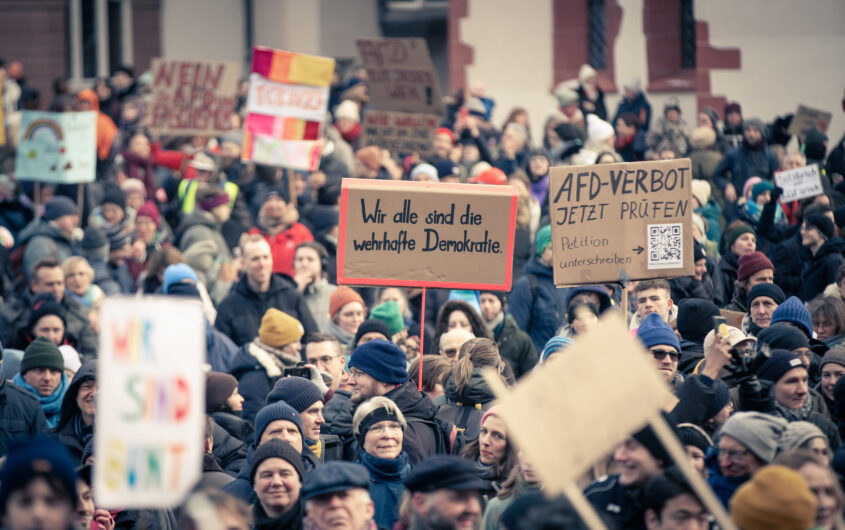
KoalaKollektiv via Flickr
Testing Democratic Resilience

Maria Skóra
Das Progressive Zentrum
Maria Skóra is an independent consultant and advisor affiliated with the Institut für Europäische Politik as a Research Fellow and a Policy Fellow at Das Progressive Zentrum. In 2019, she was a Visiting Fellow at the German Marshall Fund of the United States and AGI’s American-German Situation Room. Previously, she worked for the Humboldt-Viadrina Governance Platform and the Hertie School. She is based in Berlin and holds an MA in Sociology and a PhD in Economics.
Her interdisciplinary research focuses on (re)democratization, populism, and political sociology. From 2022 to 2024, she was a lead researcher at RESILIO, a project exploring the determinants of rule of law resilience in EU27. Her work also focused on how to improve the EU’s rule of law toolbox while facing the ongoing democratic backsliding in some member states. From 2018 to 2021, she co-designed and launched New Urban Progress, a U.S.-German exchange project bringing young professionals and experts from both sides of the Atlantic into a conversation about sustainable and equitable cities.
As a DAAD/AGI Research Fellow this fall, she will combine her expertise in democracy research with the German-American dialogue. Based on her research experience within the European context, she will apply a similar analytical framework to explore the resilience pillars of American democracy. The focus lies on different levels of the political system: political culture, institutions, actors, and citizens. The results will deliver ideas for mutual learning and designing policy responses. Both the United States and Germany face important elections in the near future. Therefore, finding meaningful synergies to make our societies and democracies more resilient against illiberal populism and political polarization is crucial.
Evidence from the United States and Germany
The purpose of this essay is to evaluate the pillars of democratic resilience in the United States and Germany. It focuses on the sources of resistance against threats to the rule of law and democracy, embracing both legal and institutional factors and social and cultural phenomena. The German and American political systems, societies, and traditions are very different. Therefore, a case study approach was applied, selecting empirical examples within each dimension of democratic resilience to enable comparisons and two-way knowledge transfer.
What is democratic resilience?
The minimalist definition of democracy sees it as an institutional framework channeling the will of the people into government action in a representative manner through free and fair elections.[1] But the spirit of democracy is embodied in principles, such as the rule of law, equality before the law, and the separation of powers. Understanding both the democratic method and the purpose of democracy will help investigate the quality of democracy in the respective countries.
The term resilience originates from natural sciences, referring to the properties of materials that can withstand a major disruption and return to their original form. Wolfgang Merkel defines democratic resilience as the ability to absorb external challenges and internal stressors and to adapt dynamically to the changing conditions without falling into regime change and abandoning defining principles, functions, and norms.[2] Merkel and Anna Lührmann identify four structural levels of democratic resilience: control and balance of constitutional powers (legislative, executive, judiciary); parties and party systems; civil society, citizen attitudes, and public discourse; and finally, the political community of citizens.[3] It corresponds with the approach of Joop van Lit, Carolien van Ham, and Maurits J. Meijers on the pillars of democratic resilience: the strength of democratic institutions, the presence of accountability mechanisms, and citizen values.[4]
From the functionalist point of view, Vanessa Boesse et al. offer a two-stage concept of democratic resilience. Onset resilience is the ability of a democratic system to prevent autocratization altogether, without losing democratic qualities. Breakdown resilience is the ability of a system to avoid a complete collapse once an autocratic episode occurs. Therefore, democratic resilience depends on strong democratic institutions and entrenched practices.[5]
Democratic resilience in the United States
The United States experienced autocratic episodes under the presidency of Donald Trump (failed onset resilience) but managed to avoid a complete collapse (retained breakdown resilience). Today’s challenges to democratic resilience are illustrated along its institutional and socio-cultural dimensions. Empirical examples refer to institutional resilience, political culture, the media and public discourse, and citizen attitudes.
President Trump’s governance style was marked by bending institutions to political will and executive aggrandizement.[6] Trump often referred to civil servants as the “deep state,” questioning their loyalty and integrity. While in office, Donald Trump involved the Justice Department against his political opponents and sought retributive action toward the independent civil servants. The resilience of the federal bureaucracy rested with individuals and their public service ethos.
In the 2016 presidential election, Donald Trump presented himself as an anti-establishment outsider. He created the Make America Great Again (MAGA) movement, parallel to the Republican Party. Due to its extraordinary mobilization capacity, he secured the GOP’s nomination in 2016. As president, Trump defied ethical standards by promoting his private business and refusing to divulge his tax records. After losing in 2020, he resorted to conspiracy theories, mobilizing the most radical supporters. He was also impeached twice by the House of Representatives, in December 2019 for obstruction of Congress and the abuse of power and in January 2021 for incitement of insurrection on January 6. In both cases, the Republican-controlled Senate acquitted him. In 2023, he was found liable for sexual abuse[7] and faced thirty-four felony convictions in total. But despite his questionable ethical record and the resistance of some prominent Republicans, Donald Trump became the GOP candidate and eventual winner for the top office in the country for the third time in 2024. The party seems neither capable of producing a counter-candidate nor willing to halt the dishonest but popular one. Meanwhile, in the opposite corner, the change of the presidential candidate without competitive primaries after Joe Biden’s spontaneous resignation was also controversial. It gave rise to questions not only about the legal challenges of such a move but also the overall democratic legitimacy of Kamala Harris as the 2024 Democratic presidential candidate.
The views on the media market in the United States are mixed. High concentration means that five major media corporations control nearly 75 percent of primetime viewing. Research shows a significant increase of estimated partisan ideologies since 2004 in major private TV networks,[8] resulting in “inverse media environments.” These information bubbles grow around opposite ideological poles, with little overlaps and hardly any space for exchanging different points of view. The hostile attitude of established politicians like Donald Trump who referred to the media as “enemies of people” made journalists concerned about press freedom, especially when the number of assaults involving physical violence spiked in 2020.
Digitalization gave rise to fragmentation and dispersion of news production and dissemination. Since 2016, election disinformation efforts by internal and foreign actors have been increasing. Trust in mass media currently matches the historical low (32 percent). Public trust in government has likewise been historically low: starting in the 1960s, it has reached unprecedented lows since 2010 and cannot turn the corner despite the changing power dynamics in the White House and Congress. At the same time, the majority of Americans (78 percent) still believe in democracy, consider it as the best form of governance, and see voting as an effective way to influence the country’s direction (57 percent). The 2020 election enjoyed the largest increase in voters on record.
In both the United States and Germany, the growing frustration with polarization and fatigue with partisan competition have not yet damaged the support for democracy.
Simultaneously, citizen opinions reveal deep partisan divisions and fatigue with polarization. Less than half of Americans can find common bi-partisan ground. Polarization affects human interactions: both Republicans and Democrats view the members of the opposite party negatively. Worrisome are the incidents of political violence. The U.S. Capitol riot on January 6th, 2021, was the most dramatic event. In the 2024 presidential campaign, two assassination attempts on Donald Trump were recorded. At the same time, since 2020, both Democrat and Republican voters have said that they want the next president to govern beyond partisan identity and “focus on addressing the concerns of all Americans.”
Democratic resilience in Germany
Germany is a high-performing, consolidated democracy. In its post-war history, the country has demonstrated high levels of onset resilience, with no autocratic episodes or other damage to the democratic system. Its resilience has recently been tested in the “soft” dimensions: political culture, the media and public discourse, and citizen attitudes.
The institutional dimension is especially more functional in Germany than in the United States. According to the World Justice Project, the overall score for Germany in 2023 was 0.83, ranking fifth across 142 countries, as compared to 0.70 for the United States (ranking twenty-sixth). The Bertelsmann Sustainable Governance Indicators laud the German political system, especially for the electoral process, the rule of law, and civil rights and liberty. But despite having a strong judiciary, functioning checks and balances, and fair and impartial electoral process, Germany is also facing challenges to its democracy.
The political scene in Germany has until recently been very stable. However, it has recently experienced a dramatic collapse of the governing coalition resulting in calling snap elections for the first time since 1982. More concerning is the continuous rise of anti-establishment political movements. The growing presence of the far-right Alternative for Germany (AfD, Alternative für Deutschland) manifests in recent (September 2024) election success in three eastern federal states. Similar to Donald Trump, the AfD brought a new quality to German politics, crossing the line of civility in public debate and competition. Key politicians of the party expressed extreme opinions on ethnic and sexual minorities, conspiracy theories, and views relativizing the Nazi regime.[9]
Regarding polarization, Germany presents a more optimistic image than the United States. The feelings of Christian Democratic Union (CDU), Christian Social Union (CSU), Social Democratic (SPD), Green, and Free Democratic (FDP) voters toward other parties range between neutral and positive, with the exception of strong negative feedback toward the AfD. The public was shocked to see the anti-vaccination movement merging with anti-government groupings and storming the Reichstag in summer 2020. Like Americans, Germans are aware of growing distances: around 74 percent consider the division of society a potential threat to democracy. Partisan division separates the mainstream majority from radicals. Even if morally understandable, applying “cancel culture” and building firewalls might prove counterproductive for winning some of the supporters back to the center. For years, isolation has only fueled the consolidation of a victim-playing strategy. A new way of dealing with undemocratic populism is needed.
Mega-trends in the media sector have caused similar effects in Germany as in many other countries: closure of traditional media outlets and job cuts in media companies. According to a Bertelsmann Foundation study, 84 percent of people in Germany consider the deliberate dissemination of false information on the Internet to be a major problem. Germany remains one of the main targets of foreign influence and hybrid warfare in Europe. Yet, the German public still trusts public broadcasters (77 percent), as opposed to social media (12 percent).
Similar to the United States, German reporters also have been witnessing hostility from radical politicians, who call them the Lügenpresse (the lying press). Reporters Without Borders note that social media attacks and acts of physical violence against journalists in Germany were on the rise in 2020, 2021, and 2022, especially during the protests against COVID-19 restrictions.
Institutional trust in Germany seems to be more affected by events such as war in Ukraine or inflation caused by the disruption of global supply chains than the outbreak of the COVID-19 pandemic or partisan competition, with only 38 percent of citizens trusting the federal government. Although voter turnout tends to be high, with 76.6 percent in the 2021 federal elections, differences are visible between the east and the west. Germans are split in half in their opinions on the functioning of democracy, but a vast majority sees it as the best form of governance and wish for more avenues for political participation.
Democratic resilience in the transatlantic context
Compared to the United States, German institutions seem more stable, but cracks across social and cultural dimensions of democratic resilience are visible on both sides of the Atlantic. First, both countries are facing the rise of anti-establishment, identity-based political actors (MAGA, AfD) on the right flank of the political spectrum. Additionally, in Germany, an illiberal left-wing newcomer is emerging, especially successful in the east of the country (BSW, Bündnis Sahra Wagenknecht). High voter turnout serves as a proxy for political participation, yet if turnout is driven by affective polarization, it often results in a relative electoral success of fringe parties. Second, partisan polarization is increasing but following different patterns: it is asymmetric in Germany, juxtaposing the political mainstream against the far-right, as compared with the two-party “hyper-polarization” in the United States. Third, the erosion of the media landscape weakens access to quality information and exposes the general public to disinformation. Attacks on critical journalism have become more common.
Strengthening democratic resilience in both countries should therefore be a priority not only for the sake of domestic safety and stability, but also for defending the transatlantic partnership in the future.
The symbolic assaults on government buildings in Berlin and Washington, DC, endorsed the use of political violence and shocked the public. Fortunately, in both the United States and Germany, the growing frustration with polarization and fatigue with partisan competition have not yet damaged the support for democracy, which provides an anchor for democratic resilience. But if combined with continued systemic erosion and institutional weaknesses, the declining social and cultural dimensions of democratic resilience might not be sufficient to prevent and withstand autocratic episodes in the future.
These risks should neither be ignored nor downplayed. Democracy is a key ingredient of stability. Both countries are key actors in the international arena and long-term allies in global security and economic architecture (NATO, G7). The gravity of this cooperation has only become more evident against the background of current geopolitical circumstances, like the Russian war against Ukraine. Meanwhile, in November 2024, the United States held presidential and congressional elections. The next federal election to the Bundestag will take place in February 2025, urged by the sudden breakdown of the governing coalition. Both ballots have the potential to make history. Indeed, in the United States, Donald Trump managed to return to the White House, and the Republican Party retained a majority in Congress, dominating federal politics with a Republican trifecta. In Germany, should the trends sustain, the AfD could be the second-biggest party countrywide, becoming a strong opposition to whichever cabinet is formed.
The American-German Institute has produced research on the transforming transatlantic relationship through the lens of domestic developments in Germany and the United States. Its policy reports[10] offer recommendations to German and U.S. decision-makers on how to enhance the German-American partnership. One of their conclusions vital for this paper refers to strengthening institutions on both sides of the Atlantic: preserving norms and traditions in governance and boosting public diplomacy. The first is an indispensable ingredient of the latter, laying the groundwork for mutual trust and credibility.[11] This is where foreign affairs and economy inevitably overlap with the quality of democracy. Strengthening democratic resilience in both countries should therefore be a priority not only for the sake of domestic safety and stability, but also for defending the transatlantic partnership in the future.
The author would particularly like to thank Neel Brown (Progressive Policy Institute) and John Austin (Brookings/Eisenhower Institute) for insightful conversations that immensely helped her navigate through the nuances of U.S. political system and domestic developments.
References:
[1] J. A. Schumpeter, (1942). Capitalism, Socialism, and Democracy (New York: Harper, 1942).
[2] Wolfgang Merkel, “Demokratische Resilienz als Konzept,” in Normative Konstituenzien der Demokratie, ed. J. Nida-Rümelin, T. Greger, A. Oldenbourg (Berlin, Boston: De Gruyter, 2024), 341-358, p. 343.
[3] Wolfgang Merkel, op. cit., p. 345.
[4] J. van Lit, C. van Ham, and M.J. Meijers, “Democratic defence. Countering autocratization: a roadmap for democratic defence,”Democratization 31, no. 4 (2023): 1–23, p. 3.
[5] V. A. Boese, A. B. Edgell, S. Hellmeier, S. F. Maerz, S. I. Lindberg, “How democracies prevail: democratic resilience as a two-stage process,” Democratization 28 no. 5 (2021): 885-907, p. 890-93, p. 886, p. 887.
[6] R. S. Foa, Y. Mounk, “America after Trump: from “clean” to “dirty” democracy?” Policy Studies 42 no.5-6 (2021): 455–472.
[7] E. Jean CARROLL v. Donald J. TRUMP, 22-cv-10016 (LAK), United States District Court, S.D. New York, Decided: July 19, 2023.
[8] G. J. Martin, A.Yurukoglu “Bias in Cable News: Persuasion and Polarization,” American Economic Review 107, no. 9 (2017): 2565–99.
[9] See: Bjorn Hocke, Maximilian Krah, Alexander Gauland.
[10] See: “Enduring Partnership. Recommendations to the Next U.S. Administration for the German-American Relationship,” American-German Institute (2020); “Transatlantic Cooperation in the Next U.S. Administration,” American-German Institute (2024).
[11] E. Langenbacher, “Renewing Institutions Strengthens Transatlantic Ties,” in: Enduring Partnership, op. cit..
Supported by the DAAD with funds from the Federal Foreign Office (FF).








